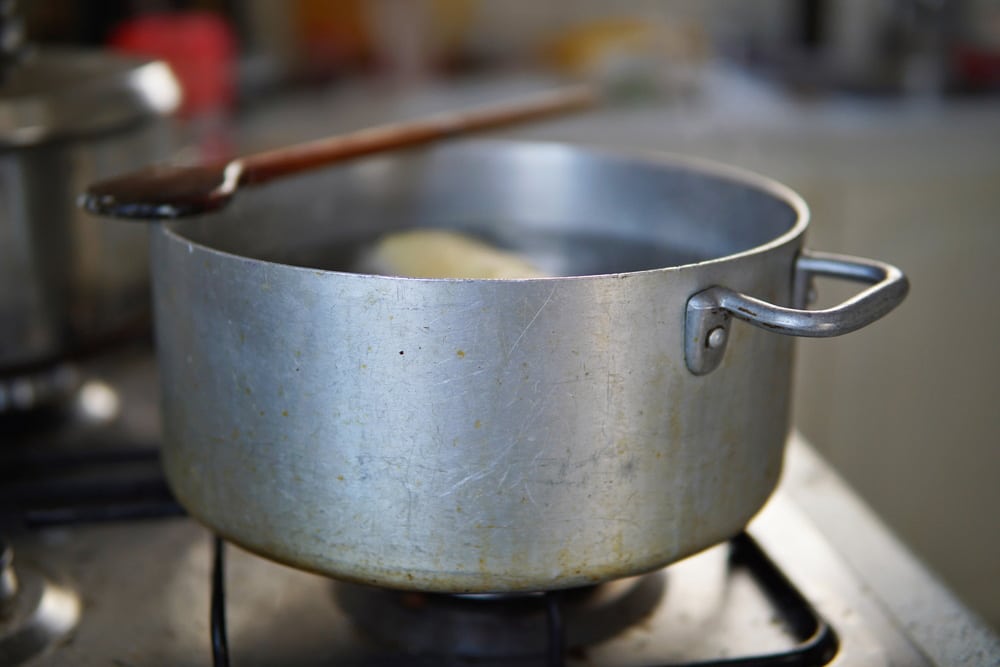
Consuming minerals and aluminum can lead to life-limiting diseases such as Alzheimer’s. However, you don’t need to worry about high-quality aluminum cookware because it’s safe according to industry standards.
If you are fond of cooking you know that Wearever is an aluminum-based kitchenware brand and you may be wondering how safe it is to use in the kitchen.
Keep reading to find out more about aluminum crockery’s safety and find out everything you need to know when using Wearever cookware.
The History of Wearever Aluminum Cookware
Wearever Cookware became a household name in the early 1900s with the products being sold door-to-door by college students and salesmen. In 1912, the United States Marine Corps commissioned Wearever aluminum utensils for standard kitchenware issue.
In 2006, Groupe SEB took over the brand from Mirro Wearever, acquiring full ownership of the inventories, equipment, and trademarks for $36.5 million. Made in the USA, Wearever Cookware includes stock and sauce pots, braziers, roast pans, and utensils.
Considered a high-quality product, Wearever pots and pans are non-stick, easy to clean, and durable, lasting for many years.
They’re made free from PTFE, PFOA, cadmium, and lead and are used in commercial kitchens such as hotels, canteens, and hospitals. Wearever pots and pans are a popular choice for the home cook too!
What is Aluminum?
Aluminum is a silvery-white metal found in the earth’s crust and is distributed throughout soil, plants, and water. It’s the 13th element found in the periodic table.
Aluminum is lightweight and malleable, making it a useful material for a range of products such as window frames, kitchenware, airplane parts, and beverage cans.
Aluminum doesn’t corrode, making it rust-resistant. It’s recyclable and is one of the most abundant metals available. Aluminum weighs one-third less than steel, making it a lightweight metal ideal for cookware and it’s easy to bend and mold into different shapes.
Ingesting this metal in high quantities can result in serious health concerns. Too much aluminum is harmful to your kidneys. It depletes your body of essential phosphorus and calcium, resulting in weaker bones if too much is consumed.
Are WearEver Aluminum Pots Safe?
Aluminum cookware is famous worldwide but many users do worry about the safety of using them for cooking food. Premium-quality cookware use this metal as an exterior surface because of its ability to conduct heat.
Wearever aluminum cookware is designed to give even heat distribution that positively influences the cooking experience. But, it’s natural to ask how healthy is it to use in the kitchen. The answer is clear though!
Wearever pots are safe from such issues because the aluminum percentage is within the standard levels approved by industry requirements for health and safety reasons. If you’re concerned about aluminum leaching into the food, rest assured that Wearever aluminum pots are safe.
Made with anodized aluminum which creates an additional lining on the surface of the pot, food is prevented from coming into contact with the raw metal. Leaching into food is minimal, creating a safe cooking experience when using Wearever cookware.
What is Anodized Aluminum?
Lightweight aluminum pots and pans have a reputation for being bad for your health! This type of material is highly reactive when cooking acidic foods such as tomatoes. Health issues associated with raw aluminum include cancer, dementia, and Alzheimer’s disease.
On the other hand, anodized aluminum is sealed. This prevents the metal from reacting with acidic food or leaching into the ingredients when you’re cooking. Anodized aluminum also prevents the cookware from losing its shape and buckling from general wear and tear.
Anodized aluminum pots and pans are twice as strong as stainless-steel cookware. However, avoid stacking them on top of each other when storing in the kitchen cupboard. This ensures they don’t get scratched or damaged when not used for cooking.
Anodized aluminum cookware is as safe as stainless-steel pots and pans with both materials having extremely low levels of toxicity. Made with anodized aluminum, Wearever cookware is safe and scratch-resistant.
When stirring or frying food, it’s recommended to avoid using sharp metal utensils to prevent scratches on the cookware surface. While the pots and pans are non-stick it’s recommended to use butter or oil when cooking to reduce the risk of food sticking to the cookware.
Anodized aluminum also makes it easy to clean dirty pots and pans after they’ve been used for cooking food. But, avoid using harsh cleaning agents or steel wool products when cleaning your Wearever aluminum cookware.
The Disadvantages of Cooking With Aluminum Cookware
One of the reasons lightweight aluminum is such a popular material for constructing pots and pans is that it’s an exceptional heat conductor. However, a downside is that it’s highly reactive with acidic foods such as citrus, tomatoes, and vinegar.
Cooking dishes such as curries, sauces, and pickles should be avoided in aluminum cookware. Cooking these items in aluminum pots can cause the metal to leach into the foods, resulting in a metallic taste.
The cookware can end up with a pitted surface too, increasing the risk of leaching and a tinny or metallic taste in food.
Another disadvantage of cooking with aluminum pots is the discoloration of alkaline food such as egg whites which turn a dirty gray when cooked with this reactive material.
We highly recommend avoiding cooking foods such as these mentioned in low-quality aluminum pots if you want to avoid unpleasant taste or discoloration of food. Aluminum cookware isn’t as long-lasting as other materials used to make pots and pans.
It tends to warp over time and you’ll end up having to replace them every year or so. While ingesting small amounts of aluminum isn’t hazardous, too much can lead to health concerns.
However, research is ongoing as to whether this metal is the reason why some people suffer from dementia or Alzheimer’s disease.
Cooking In Wearever Aluminum Pots
Wearever aluminum pots are handy when it comes to efficient heat distribution and conduction during cooking. They’re incredibly safe to use as well with anodized aluminum used to construct this brand’s cookware items.
The material doesn’t react with food nor leach into the ingredients. Cladding with stainless steel also makes these pots highly safe to use in the kitchen.
According to various studies, the Wearever aluminum pots heat up 16 percent faster when compared to stainless-steel cookware. The other advantage is that Wearever aluminum pots are lightweight and affordable.
When cooking with Wearever pots, make sure they’re scratch-free and free from pitting. These signs of damage can increase the risk of metal leaching into your food and it’s best to discard the item.
The Bottom Line
The bottom line is that Wearever aluminum pots are easy and safe to use. Made with anodized aluminum, you can rest assured your Wearever cookware will give you an excellent cooking experience.
Acidic food won’t react with the pot material which means you don’t have to worry about a metallic taste in your dish. Leaching and pitting are the least of your concerns when using Wearever aluminum pots in your kitchen.
Knowing that the taste, texture, and appearance of your meal cooked in a Wearever pot is as it should be – scrumptious – you can relax using this aluminum cookware!
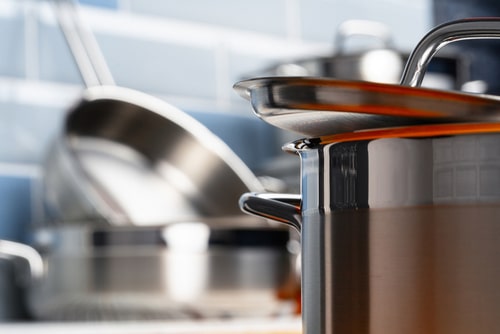
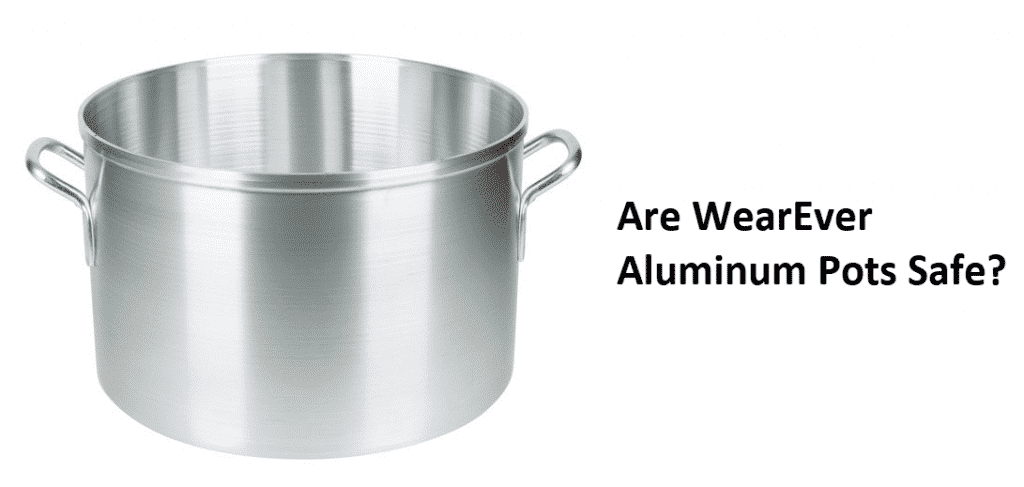
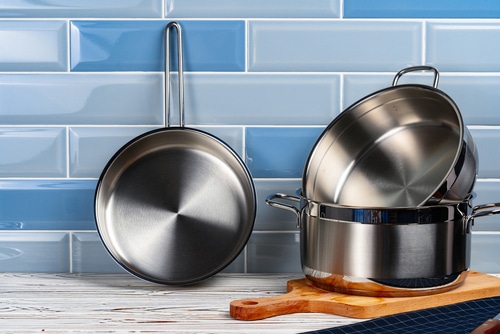
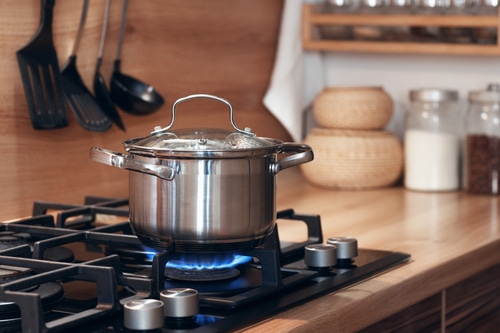
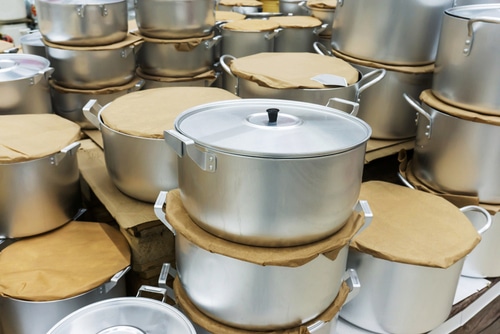
I can’t wait to throw all of my wearever in the trash!!! Shame on you for giving us Alzheimer’s